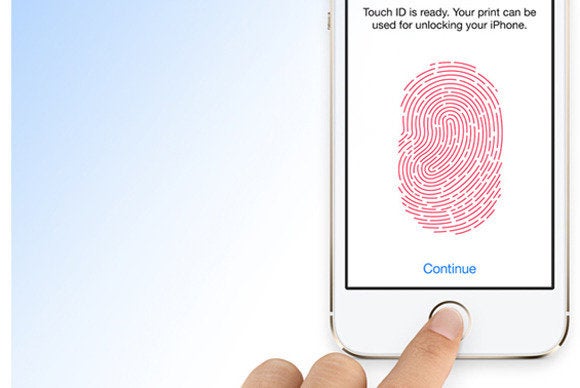
Posted on 05/09/2016 12:39:28 PM PDT by Swordmaker
Judges in the U.S. have ordered people to unlock their fingerprint-locked phones. Coercion by others remains an issue.

Should you be able to plead the Fifth when a judge forces you to use your fingerprints to unlock an iPhone?
That’s the latest ongoing debate in a Los Angeles courtroom after a judge compelled a woman in custody to use Touch ID to unlock an iPhone. Legal experts are arguing that this goes against the Fifth Amendment’s protection against self-incrimination because the authorities would then have access to potentially-incriminating personal data stored on the device.
The debate started after authorities obtained a search warrant for Paytsar Bkhchadzhyan, the girlfriend of a suspected Armenian gang member, to use her fingerprints to unlock an iPhone seized from a home in Glendale, California. The iPhone in question was enabled with Touch ID sensor technology.
In February, Bkhchadzhyan was sentenced to a felony count of identify theft. According to court documents, it only took 45 minutes after Bkhchadzhyan was taken into custody for U.S. Magistrate Judge Alicia Rosenberg to order her to press her fingerprints on the iPhone. Bkhchadzhyan’s fingerprints were collected by an FBI agent that same day.It’s the same as if she went home and pulled out paper documents—she’s produced it.
Even though the U.S. Supreme Court has ruled that authorities can obtain a search warrant for mobile phones and can force people in custody to hand over physical evidence including fingerprints without a judge order, legal experts say this case is different. Their argument is that forcing a person to use their fingerprints to unlock an iPhone could be a form of self-incrimination, in violation of the Fifth Amendment.
According to Susan Brenner, a law professor at the University of Dayton, this is on par with unlawfully forcing someone to testify incriminating testimony. By unlocking the iPhone with her fingerprints, Bkhchadzhyan would be authenticating the data on the phone and become associated with it.
“By showing you opened the phone, you showed that you have control over it,” Brenner told the LA Times. “It’s the same as if she went home and pulled out paper documents—she’s produced it.”’Put your finger here’ is not testimonial or self-incriminating.
But not every legal expert believes that fingerprints fall under the Fifth Amendment’s protection against self-incrimination. In fact, Touch ID may be a legal loophole to forcing someone to reveal their passcode.
“Unlike disclosing passcodes, you are not compelled to speak or say what’s ‘in your mind’ to law enforcement,” Albert Gidari, the director of privacy at Stanford Law School’s Center for Internet and Society, told the LA Times. “‘Put your finger here’ is not testimonial or self-incriminating.”
Why this matters: The issue boils down to the earlier ruling that fingerprints are “physical evidence,” like a key. The legal system does not require a search warrant for physical evidence. However, producing an iPhone passcode is considered knowledge stored in one’s mind, so forcing someone to disclose the passcode is protected under the Fifth Amendment.
It gets murky, however, with fingerprint sensors that unlock mobile phones. For Touch ID to be able to unlock an iPhone, a person has to physically press down on the device. A fingerprint scan won’t do. So it’s more involved than just handing over a key. It’s forcing someone to perform an action with a key only they can use.
How long before an app exists that lets you lock the phone entirely with the wrong finger? I know the thumb or forefinger is the easier ones to use but maybe you assign the unlock to a pinky and a self destruct to the forefinger, problem solved.
I would be surprised if you could stop them even if they don't have a court order. All they have to do is cry terrorist.
Sand paper your finger tips. Or wash a lot. That will remove ridges. Also if your hands are sticky the finger print reader doesn’t work well. Also if you don’t place the proper finger on the pad it won’t work
The Apple TouchID doesn't read the fingerprint. It reads the subcutaneous hills and valleys of the fat layer underneath the fingerprint. That's why a printed fingerprint won't work on the Apple devices with TouchID.
There are many reasons to look in a safe and you don’t just have to cry terrorist. The FBI has been doing this on white collar crimes for years.
I was thinking that. Or just have tom cruise lift it with some scotch tape. :)
Not me. Kid was in an accident and the iPhone was so wrecked the screen wasn't even attached any more and in fact was shattered and the antenna was hanging by a wire. He was actually able to call home using Siri to tell his family he was in the ER by saying "Hey Siri, call home!" It did.
Or...just grow a new finger from a piece of dna?
Disclaimer: Opinions posted on Free Republic are those of the individual posters and do not necessarily represent the opinion of Free Republic or its management. All materials posted herein are protected by copyright law and the exemption for fair use of copyrighted works.